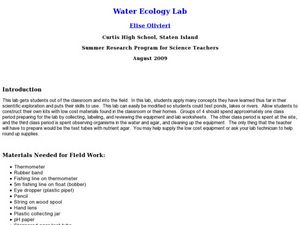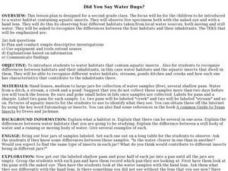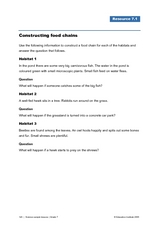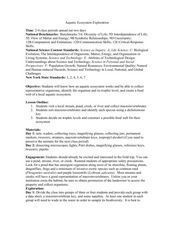Curated OER
Pond Water
Students explore a creek environment. They make observations, identify the living and nonliving factors in the environment and collect a plankton sample to take back to the classroom. In addition, they look at plankton under a microscope.
Curated OER
Life in a Drop of Water
Students observe the wealth of living organisms in a drop of water from our freshwater ecosystems. They classify the types of organisms observed as single-celled or multi-cellular and use a key or chart to identify and name the organisms...
Curated OER
Water Ecology Lab
Students determine the characteristics of a stream ecosystem and its organisms. In this water ecology lesson students complete several labs that shows them presence of life, water appearance, and water flow.
Curated OER
Pond 1: Pond Life
Students work together to investigate familiar and unfamiliar ecosystems. Using the internet, they discover how different organisms use their environment to satisfy their needs. They also examine the relationshiops between organisms...
Curated OER
Did You Say Water Bugs?
Second graders observe live specimens of aquatic insects in a water habitat. They study specimens from both moving and still water with the naked eye and a hand lens.
Curated OER
Measuring Water Temperature
Learners measure the temperature of three water sources. They collect data points every second for twenty five seconds for each sample using Lego Robolab temperature sensors, complete a worksheet, and analyze the data.
Curated OER
Constructing Food Chains
Students explore different habitats and the food chains within. In this food web lesson students construct food chains for different habitats.
Curated OER
The Marvels of Mud
Young scientists roll up their sleeves and get a little dirty in this three-day earth science investigation. Following the scientific method, children monitor the growth of algae in pond water samples in order to determine the role that...
Curated OER
Sediment Sleuths
Are you looking for a good, solid lesson on sedimentary rocks? This one, produced by the Illinois State Museum, is just such a lesson. Middle schoolers identify common rocks and minerals by analyzing sediments from local water sources....
Curated OER
Creatures in Torch Lake
Students investigate pond ecology. They gather water samples from various sources, add grass, and let it sit for a week. Afterward, using microscopes, they identify the microorganisms present in the sample.
Curated OER
Ecosystems
Third graders identify and define an Ecosystem and the basic needs of all animals. They collect pond water in a pickle jar. They observe the organisms that are in the jar to keep an ongoing record of the creatures and their population.
Curated OER
Science Trail
Fourth graders explore the concept of ecosystems. In groups, they examine clues to find mystery objects. Once they find the mystery objects, they discuss what ecosystem each comes from. They also look at pond water samples under a...
Curated OER
Spud Smear
Learners study various samples of microorganisms in petri dishes. In this microorganism lesson, students place various samples of items in petri dishes and observe them after several days of incubation.
Curated OER
Ugh! We DRINK This Stuff?
Learners explain the processes involved in the cleansing and purifying of surface water. After a lecture/demo, students engage in an experiment that illustrates how water is cleansed before we drink it.
Curated OER
Investigating Earth's Materials
First graders compare and contrast water from different sources. After collecting water from various sources, 1st graders create a list of observable properties of the water. Students then pour the water into a filter and observe the...
Curated OER
Comparative Stream Quality
Young scholars examine water quality on a nearby stream. They collect water samples and test for various factors, including any contamination from the treatment plant, and present their information in a Powerpoint presentation.
Curated OER
A "Sedimental" Journey-Sediment Collection
Students are asked how they would gather a sample of sediment from a lake, stream, river, pond, or swamp. They discuss safety concerns involving sample collections. Students are instructed to stay out of the water and to be careful not...
Curated OER
ExplorA-Pond: 6th Grade Area and Random Number Tables
Sixth graders estimate the surface area of a pond using a random number table.
Curated OER
ExplorA-Pond:3rd Grade Probability
Third graders cut a map of a pond into grid squares. They count the total number of squares and calculate the probability of drawing a pond piece vs. a shoreline piece. They draw 10 pieces and compare the results with the original...
Curated OER
Sand Shakes & Mud Pies: Investigating Sediment
Take a field trip to a location where water and land meet to study patterns of sediment organization in wet habitats: river or ocean beaches, sand dunes, tidal marshes, the edge of a pond, or a woodland stream. Small groups collect pairs...
Curated OER
How Do Plants and Animals Change the Environment Around Them?
If you have elodea and snails in your classroom aquarium, or if you have access to a pond with these organisms, your young biologists can set up a controlled experiment to determine how certain ecosystems respond in light and dark...
Curated OER
Aquatic Ecosystem Exploration
Students visit a local stream, pond, creek, or river and collect macroinvertebrates. They sort macroinvertebrates and identify each species using a dichotomous key. Students decide on trophic levels and construct a possible food web for...
Curated OER
Painting - Science Integration - Ponds - Monet - Painting
First graders identify Monet as an Impressionist artist. They create impressions of trees and bushes, paint with sponges, and mix tints and shades. They create impressions of flowers with q-tip dabbing and mixing tints and shades.
Curated OER
Does the Introduction of Pesticides and Fertilizers Alter an Aquatic Ecosystem?
Students conduct an experiment using a small sample from a local water source. They introduce fertilizers and pesticides, separately, and carefully examine the results in their simulated aquatic ecosystem.

























